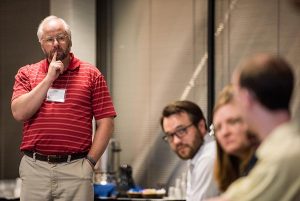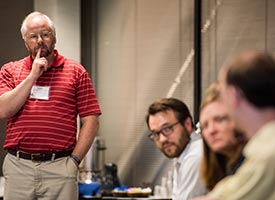By Paula Schlueter Ross (paula.ross@lcms.org)
ST. LOUIS — When the Rev. Andy and Nikki Becker were asked if they would consider serving as facilitators for the Synod’s Post-Seminary Applied Learning and Support (PALS) program, they “prayerfully considered it” but it was “easy” for them to say yes.

As part of a “phenomenal” PALS group for the first three years of Andy Becker’s ministry, the couple knew how valuable the program was “for the pastors, for their wives, for their families, for the congregations,” said Becker, associate pastor of St. John’s Lutheran Church in Arnold, Mo.
Even though he had served as a director of Christian education before entering Concordia Seminary, St. Louis, Becker still had to adjust to his new congregation and pastoral life in his new call: duties such as leading anxious couples in pre-marital counseling for the first time. Performing his first wedding, his first funeral.
The PALS program brings new pastors and their wives — fresh from seminary life — together in small groups for the first three years of ministry to share experiences, learn from relevant study topics and support one another.
“I just loved the interaction with the other pastors and their wives,” Becker told Reporter. “Just [having] a safe place to talk, but also the sharing of ideas” was beneficial to him as a new pastor, he said.
Nikki Becker agreed. PALS was “very helpful” and “the support was excellent,” she said.
In fact, now two years out of the program, the Beckers still get together socially with their fellow PALS-group couples to “stay connected.”
The Beckers were among 31 PALS facilitators (18 pastors and 13 wives) who attended an Aug. 4-5 training conference at the LCMS International Center here. (Another 31 facilitators serve the 17-year-old PALS program, but were not at the conference.)
Even though PALS facilitators lead groups in 32 of the Synod’s 35 districts, only about half of the church body’s seminary graduates decide to join a PALS group. That’s unfortunate, says the Rev. Dr. Gary Zieroth, interim director of the PALS program, who would “absolutely” like to see every new LCMS pastor in PALS:
- “for opportunities for worship and study in the Word.
- “for the mutual support and encouragement given and received.
- “for a chance to learn that there are still answers to questions not fully addressed at the seminary level.
- “for a chance to get away from the parish and to rest and relax.
- “for a chance to learn from more experienced pastors and wives — and a curriculum that has been developed to help specifically meet the needs of those just starting out in the ministry.”
Many pastors get “burned out” early in their ministries, according to Zieroth, senior pastor of St. John’s Lutheran Church in Chaska, Minn. “They can get discouraged and even depressed,” he told Reporter.
“PALS is one great opportunity pastors and wives can take advantage of — not only to survive in the ministry, but to thrive in the ministry.”
In the years before 1998, when PALS was started, more than a quarter of new LCMS pastors quit before their sixth year of ministry, noted longtime PALS Facilitator Rev. Barry Hildebrandt, pastor of Cross of Christ Lutheran Church in Chattanooga, Tenn.
Hildebrandt, 68, who began as a PALS facilitator in 1999, said he has “seen the impact of the stresses that are placed on young men” in the early years of their first calls, and he says he “knows from personal experience” that PALS has kept couples in ministry.
The collegiality PALS fosters among new pastors and their wives helps them “see that they’re not so isolated, that they’re not abnormal in terms of the problems they are facing, that there are others who’ve been there … and can help.”
Perhaps most valuable, PALS offers “a confidential place where they can talk” but is “encouraging, very upbeat — it’s not a gripe session,” says Hildebrandt, whose PALS group includes pastors (and wives) from as many as four Synod districts at times (because of Chattanooga’s close proximity to Alabama, Georgia and the Carolinas).
In his opening address to PALS facilitators at the conference, LCMS Chief Mission Officer Rev. Kevin Robson acknowledged that he’s “a recipient of the blessings of the PALS program,” calling the experience “a place of refuge, and peace, and openness, and honesty” and “absolutely wonderful.”
Prior to entering Concordia Theological Seminary, Fort Wayne, Ind., in 1997 (he graduated in 2001), Robson enjoyed a career in corporate research and development, product management, sales and consulting. But, he told the facilitators, he’s “never regretted” his decision to answer God’s call to full-time ministry.
Now, as the Synod’s CMO, a “hot item” on his to-do list, Robson said, is the formation of a Synod task force to address graduating seminarians’ educational debt. With representatives from both LCMS seminaries and various Synodwide corporate entities, the task force — to be convened within the “next several months” — will brainstorm ways to comprehensively address this “very substantial issue for our church body.” Its goal will be to produce “actionable recommendations” for endorsement at next summer’s national LCMS convention, he said.
“Life in the parish isn’t getting any easier,” acknowledged PALS Coordinator Carrie O’Donnell. “As our country becomes increasingly secular and hostile to Christianity, we more than ever need to support our professional church workers and their families.
“We need the best seminary education possible to give these men the theological foundation necessary to face today’s challenges,” O’Donnell told Reporter. “And we need programs like PALS to support them and continue their pastoral formation during the critical early years of their ministries.”
The conference included discussions of the roles and responsibilities of facilitators, challenges, best practices and good ideas, and featured a panel discussion with four new pastors and two of their wives who shared their ministry challenges and PALS experiences.
Panel member Rev. Luke Wolters, a 2012 Concordia Seminary graduate who is pastor of Grace Lutheran Church, Wellsville, Mo., spoke of “how positive” his PALS group was: “You always came away encouraged,” he said.
This year’s conference offered a special presentation by Dr. Thaddeus Warren, professor of Human and Social Science at Concordia University, Nebraska, Seward, on “Group Dynamics” and “Facilitating a Group.” Warren shared information to help facilitators better understand how groups function, on methods designed to build cohesive groups and about the various roles played in groups, including that of a facilitator.
LCMS Montana District President Rev. Terry Forke led a session on “The Future of Synod’s Continuing Education Efforts and the Personal Growth and Support Project,” a process to help pastors make a plan for their own continuing education in partnership with their congregations and district presidents. Forke described the Synod’s plan to help each pastor develop, and keep track of, his “personal continuing-education program.”
The Rev. Gregory Michel, pastor of St. Matthew Lutheran Church in Milan, Ill., who is beginning his third year as a PALS facilitator, said the annual training conference “is always helpful,” especially for “learning new ideas” that have worked in other groups.
Even though PALS “is another thing on my plate,” Michel said, “I love doing it because it’s a way that I can help new pastors, and thereby help the church as a whole. Because when the pastors are healthy, that certainly helps the health of the church.”
To learn more about PALS — which is available to LCMS pastors in their first three years of ministry — send an email to the Rev. Dr. Gary Zieroth at gary.zieroth@lcms.org.
View photo galleryPosted Aug. 13, 2015
